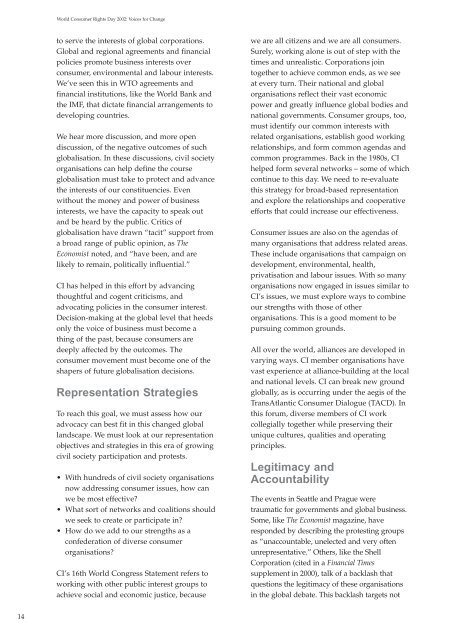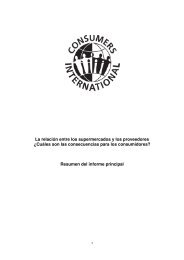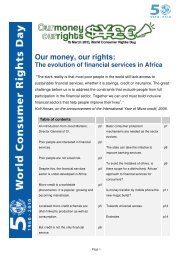Voices for Change: the Consumer Right to Representation
Voices for Change: the Consumer Right to Representation
Voices for Change: the Consumer Right to Representation
You also want an ePaper? Increase the reach of your titles
YUMPU automatically turns print PDFs into web optimized ePapers that Google loves.
14<br />
World <strong>Consumer</strong> <strong>Right</strong>s Day 2002: <strong>Voices</strong> <strong>for</strong> <strong>Change</strong><br />
<strong>to</strong> serve <strong>the</strong> interests of global corporations.<br />
Global and regional agreements and financial<br />
policies promote business interests over<br />
consumer, environmental and labour interests.<br />
We’ve seen this in WTO agreements and<br />
financial institutions, like <strong>the</strong> World Bank and<br />
<strong>the</strong> IMF, that dictate financial arrangements <strong>to</strong><br />
developing countries.<br />
We hear more discussion, and more open<br />
discussion, of <strong>the</strong> negative outcomes of such<br />
globalisation. In <strong>the</strong>se discussions, civil society<br />
organisations can help define <strong>the</strong> course<br />
globalisation must take <strong>to</strong> protect and advance<br />
<strong>the</strong> interests of our constituencies. Even<br />
without <strong>the</strong> money and power of business<br />
interests, we have <strong>the</strong> capacity <strong>to</strong> speak out<br />
and be heard by <strong>the</strong> public. Critics of<br />
globalisation have drawn “tacit” support from<br />
a broad range of public opinion, as The<br />
Economist noted, and “have been, and are<br />
likely <strong>to</strong> remain, politically influential.”<br />
CI has helped in this ef<strong>for</strong>t by advancing<br />
thoughtful and cogent criticisms, and<br />
advocating policies in <strong>the</strong> consumer interest.<br />
Decision-making at <strong>the</strong> global level that heeds<br />
only <strong>the</strong> voice of business must become a<br />
thing of <strong>the</strong> past, because consumers are<br />
deeply affected by <strong>the</strong> outcomes. The<br />
consumer movement must become one of <strong>the</strong><br />
shapers of future globalisation decisions.<br />
<strong>Representation</strong> Strategies<br />
To reach this goal, we must assess how our<br />
advocacy can best fit in this changed global<br />
landscape. We must look at our representation<br />
objectives and strategies in this era of growing<br />
civil society participation and protests.<br />
• With hundreds of civil society organisations<br />
now addressing consumer issues, how can<br />
we be most effective?<br />
• What sort of networks and coalitions should<br />
we seek <strong>to</strong> create or participate in?<br />
• How do we add <strong>to</strong> our strengths as a<br />
confederation of diverse consumer<br />
organisations?<br />
CI’s 16th World Congress Statement refers <strong>to</strong><br />
working with o<strong>the</strong>r public interest groups <strong>to</strong><br />
achieve social and economic justice, because<br />
we are all citizens and we are all consumers.<br />
Surely, working alone is out of step with <strong>the</strong><br />
times and unrealistic. Corporations join<br />
<strong>to</strong>ge<strong>the</strong>r <strong>to</strong> achieve common ends, as we see<br />
at every turn. Their national and global<br />
organisations reflect <strong>the</strong>ir vast economic<br />
power and greatly influence global bodies and<br />
national governments. <strong>Consumer</strong> groups, <strong>to</strong>o,<br />
must identify our common interests with<br />
related organisations, establish good working<br />
relationships, and <strong>for</strong>m common agendas and<br />
common programmes. Back in <strong>the</strong> 1980s, CI<br />
helped <strong>for</strong>m several networks – some of which<br />
continue <strong>to</strong> this day. We need <strong>to</strong> re-evaluate<br />
this strategy <strong>for</strong> broad-based representation<br />
and explore <strong>the</strong> relationships and cooperative<br />
ef<strong>for</strong>ts that could increase our effectiveness.<br />
<strong>Consumer</strong> issues are also on <strong>the</strong> agendas of<br />
many organisations that address related areas.<br />
These include organisations that campaign on<br />
development, environmental, health,<br />
privatisation and labour issues. With so many<br />
organisations now engaged in issues similar <strong>to</strong><br />
CI’s issues, we must explore ways <strong>to</strong> combine<br />
our strengths with those of o<strong>the</strong>r<br />
organisations. This is a good moment <strong>to</strong> be<br />
pursuing common grounds.<br />
All over <strong>the</strong> world, alliances are developed in<br />
varying ways. CI member organisations have<br />
vast experience at alliance-building at <strong>the</strong> local<br />
and national levels. CI can break new ground<br />
globally, as is occurring under <strong>the</strong> aegis of <strong>the</strong><br />
TransAtlantic <strong>Consumer</strong> Dialogue (TACD). In<br />
this <strong>for</strong>um, diverse members of CI work<br />
collegially <strong>to</strong>ge<strong>the</strong>r while preserving <strong>the</strong>ir<br />
unique cultures, qualities and operating<br />
principles.<br />
Legitimacy and<br />
Accountability<br />
The events in Seattle and Prague were<br />
traumatic <strong>for</strong> governments and global business.<br />
Some, like The Economist magazine, have<br />
responded by describing <strong>the</strong> protesting groups<br />
as “unaccountable, unelected and very often<br />
unrepresentative.” O<strong>the</strong>rs, like <strong>the</strong> Shell<br />
Corporation (cited in a Financial Times<br />
supplement in 2000), talk of a backlash that<br />
questions <strong>the</strong> legitimacy of <strong>the</strong>se organisations<br />
in <strong>the</strong> global debate. This backlash targets not






![pkef]Qmf eg]sf] s] xf] < - Consumers International](https://img.yumpu.com/6479658/1/184x260/pkefqmf-egsf-s-xf-consumers-international.jpg?quality=85)
